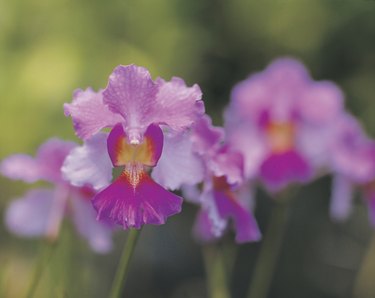
Pet dogs and cats tend to get into things they shouldn't, whether indoors or out. Among the most unnerving concerns is knowing which plants in the yard or house are toxic to your furry companions. Hardy in U.S. Department of Agriculture plant hardiness zones 3 through 12, depending on type, orchids (family Orchidaceae) can be found from just south of the Arctic Circle to the tropical jungles of the Southern Hemisphere. Though eating the leaves or flowers of your prized specimen may induce vomiting or other gastric distress, orchids are not poisonous to cats or dogs.
The Orchid Species
Video of the Day
Orchids are to plant lovers what dogs are to animal lovers. Over the centuries, both orchids and dogs have been extensively bred to create new breeds or genetic lines. While 25,000 orchid species are known worldwide, at least 100,000 hybrids or grexes are registered. The genetic lineages of modern orchid hybrids are complex and confusing.
Video of the Day
In the United States, native orchids grow outdoors in sunny fields and woodlands and in shade gardens. A wide array of tropical orchids are also grown as houseplants, and also used as cut flowers in bouquets.
While orchids are not considered toxic to dogs and cats, there always is a chance that an orchid hybrid carries that one odd gene that creates a harmful compound in leaves or flowers that could cause sickness in a pet. Always keep your orchids and other plants out of reach of your pets and children.
Orchid Safety: Dogs and Cats
The American Society for the Prevention of Cruelty to Animals currently publishes extensive lists of both known toxic and nontoxic plants for dogs and cats on its website. The lists are nonexhaustive, and include only the most commonly encountered plants in the United States. No orchids are listed as being toxic for either dogs or cats, with several orchids explicitly listed on the nontoxic list for both animals. It's important to note, however, that if you use chemicals on your orchids, such as insecticides or fertilizers, the chemicals may be toxic to your dog or cat instead of the actual orchid plant.
Poison Prevention: Dogs and Cats
As with any plant eaten by a cat or dog, the size of the animal — its body mass — and the amount of plant eaten affects the reaction seen. Smaller animals need to eat less plant material to be affected. Sometimes the fresh greenery upsets the stomach and leads to usual coughing and vomiting of hairballs. Even though there is some evidence from the ASPCA that most orchids aren't toxic to these critters, not all orchids are represented or tested.
If possible, discourage or train your dog or cat to not eat orchids. Your first reaction should be identify the plant eaten, to be certain it truly is an orchid, especially if hiking in the wild. Assume the orchid isn't harmful, but monitor the pet and watch for symptoms of sickness such as foaming of the mouth, change in demeanor or other behavioral changes. Contact your veterinarian if symptoms arise and you suspect any plant was eaten.
"Orchids" Poisonous to Pets
The name "orchid" is not specific unless the plant is in the orchid family, Orchidaceae. Many non-orchid-family plants may be colloquially called orchids or superficially resemble an orchid. Plants that have a common name of orchid but are not in the orchid family may be toxic to dogs or cats. It depends on the precise identity of the plant.
For example, the orchid tree (Bauhinia variegata), hardy in USDA 9 through 11, is not a real orchid, but a member of the legume family, Fabaceae. The orchid cactus (Epiphyllum spp.), grown as a houseplant and hardy in USDA zones 10 through 11, also shares the orchid name and is not poisonous to dogs and cats. Conversely, not all true orchids are commonly called orchids, but by more ambiguous names such as lady slippers or lady's tresses. This can add to the anxiety associated with a family dog or cat eating an unknown plant or one that somebody referred to as an orchid or looks like an orchid.
While not members of the orchid family, some flowers often found in and around homes, such as lilies (Lilium spp.) and daylilies (Hemerocallis spp.), are highly poisonous to cats. Hardy in USDA zones 3 through 9 and 4 through 9, respectively, these beautiful flowers should not be planted in a cat-lover's garden or used in bouquets in homes where cats live.